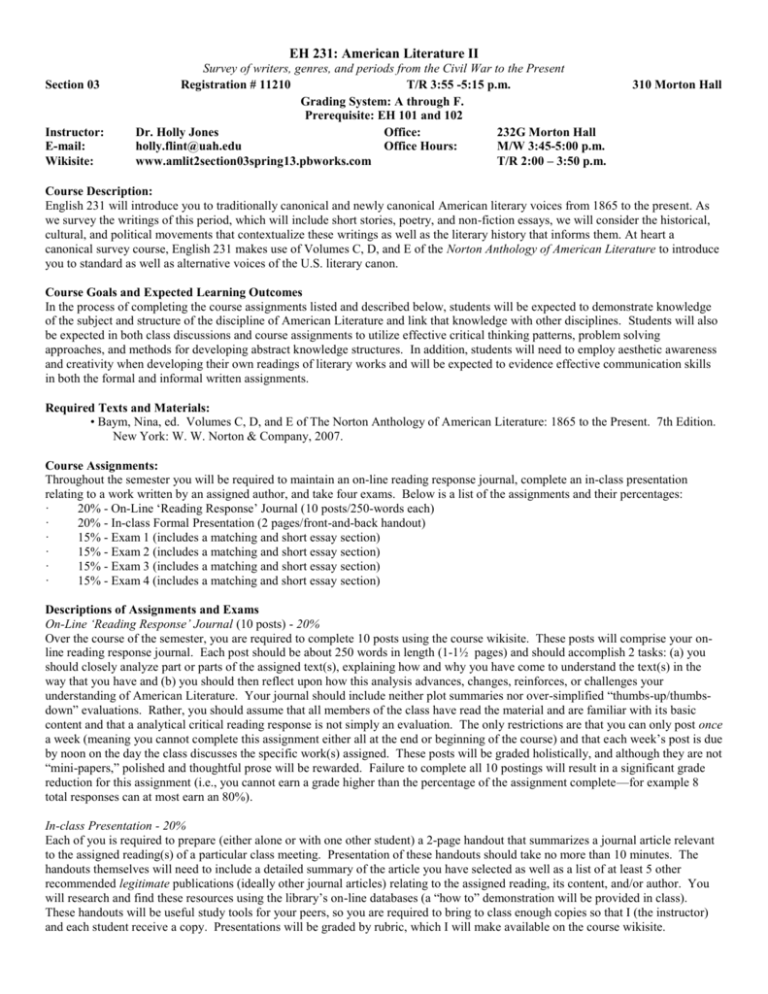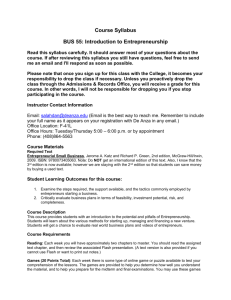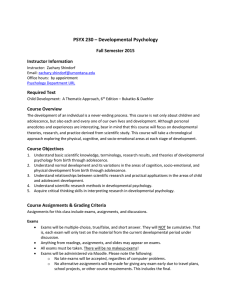EH 231: American Literature II Survey of writers, genres, and periods
advertisement

EH 231: American Literature II Section 03 Instructor: E-mail: Wikisite: Survey of writers, genres, and periods from the Civil War to the Present Registration # 11210 T/R 3:55 -5:15 p.m. Grading System: A through F. Prerequisite: EH 101 and 102 Dr. Holly Jones Office: 232G Morton Hall holly.flint@uah.edu Office Hours: M/W 3:45-5:00 p.m. www.amlit2section03spring13.pbworks.com T/R 2:00 – 3:50 p.m. 310 Morton Hall Course Description: English 231 will introduce you to traditionally canonical and newly canonical American literary voices from 1865 to the present. As we survey the writings of this period, which will include short stories, poetry, and non-fiction essays, we will consider the historical, cultural, and political movements that contextualize these writings as well as the literary history that informs them. At heart a canonical survey course, English 231 makes use of Volumes C, D, and E of the Norton Anthology of American Literature to introduce you to standard as well as alternative voices of the U.S. literary canon. Course Goals and Expected Learning Outcomes In the process of completing the course assignments listed and described below, students will be expected to demonstrate knowledge of the subject and structure of the discipline of American Literature and link that knowledge with other disciplines. Students will also be expected in both class discussions and course assignments to utilize effective critical thinking patterns, problem solving approaches, and methods for developing abstract knowledge structures. In addition, students will need to employ aesthetic awareness and creativity when developing their own readings of literary works and will be expected to evidence effective communication skills in both the formal and informal written assignments. Required Texts and Materials: • Baym, Nina, ed. Volumes C, D, and E of The Norton Anthology of American Literature: 1865 to the Present. 7th Edition. New York: W. W. Norton & Company, 2007. Course Assignments: Throughout the semester you will be required to maintain an on-line reading response journal, complete an in-class presentation relating to a work written by an assigned author, and take four exams. Below is a list of the assignments and their percentages: · 20% - On-Line ‘Reading Response’ Journal (10 posts/250-words each) · 20% - In-class Formal Presentation (2 pages/front-and-back handout) · 15% - Exam 1 (includes a matching and short essay section) · 15% - Exam 2 (includes a matching and short essay section) · 15% - Exam 3 (includes a matching and short essay section) · 15% - Exam 4 (includes a matching and short essay section) Descriptions of Assignments and Exams On-Line ‘Reading Response’ Journal (10 posts) - 20% Over the course of the semester, you are required to complete 10 posts using the course wikisite. These posts will comprise your online reading response journal. Each post should be about 250 words in length (1-1½ pages) and should accomplish 2 tasks: (a) you should closely analyze part or parts of the assigned text(s), explaining how and why you have come to understand the text(s) in the way that you have and (b) you should then reflect upon how this analysis advances, changes, reinforces, or challenges your understanding of American Literature. Your journal should include neither plot summaries nor over-simplified “thumbs-up/thumbsdown” evaluations. Rather, you should assume that all members of the class have read the material and are familiar with its basic content and that a analytical critical reading response is not simply an evaluation. The only restrictions are that you can only post once a week (meaning you cannot complete this assignment either all at the end or beginning of the course) and that each week’s post is due by noon on the day the class discusses the specific work(s) assigned. These posts will be graded holistically, and although they are not “mini-papers,” polished and thoughtful prose will be rewarded. Failure to complete all 10 postings will result in a significant grade reduction for this assignment (i.e., you cannot earn a grade higher than the percentage of the assignment complete—for example 8 total responses can at most earn an 80%). In-class Presentation - 20% Each of you is required to prepare (either alone or with one other student) a 2-page handout that summarizes a journal article relevant to the assigned reading(s) of a particular class meeting. Presentation of these handouts should take no more than 10 minutes. The handouts themselves will need to include a detailed summary of the article you have selected as well as a list of at least 5 other recommended legitimate publications (ideally other journal articles) relating to the assigned reading, its content, and/or author. You will research and find these resources using the library’s on-line databases (a “how to” demonstration will be provided in class). These handouts will be useful study tools for your peers, so you are required to bring to class enough copies so that I (the instructor) and each student receive a copy. Presentations will be graded by rubric, which I will make available on the course wikisite. Four Exams - 15% Each The exams will require that you demonstrate knowledge of the readings (author names, titles, plots/content) and will ask you to demonstrate your ability to analyze (and recognize) significant passages from assigned texts. Each will be administered in class and no “make-up” date will be available. For any student who does not sit for an individual exam, the grade achieved on the next exam will count for the one missed. If a student misses more than one exam, no grade will entered for the second missed exam (i.e., the student will earn no points) unless documentation is provided showing reasonable cause for the absence. Attendance Policy If you miss a class, it is your responsibility to get the assignments and complete the work. That said, you are permitted 2 unquestioned absences (the equivalent to one week). After that I reserve the right to reduce your grade as I consider appropriate; absences beyond the allowed 2 that are neither excused nor explained can lower your grade down to and including an “F.” The bottom line: your success in this class depends upon your participation and preparation every day. Withdrawal Policy Students who drop this course are responsible for properly withdrawing. With this in mind, here are some dates to remember: January 11th - Last day to add a class January 18th - Last day to withdraw and receive tuition refund January 28th - Last day to apply for pass/fail February 4th - Last day to change from credit to audit March 18th - Last day to withdraw Academic Honesty Your written assignments and examinations must be your own work. Academic misconduct will not be tolerated. To ensure that you are aware of what is considered academic misconduct, you should review carefully the definition and examples provided in Article III, Code of Student Conduct, Student Handbook, p. 93. If you have any questions in this regard, please contact me right away. Use of Prior Work You may not submit in fulfillment of requirements in this course any work submitted, presented, or used by you in any other course at UAHuntsville or any other educational institution. Classroom Conduct All students in the class must treat others with civility and respect and conduct themselves during class sessions in a way that does not unreasonably interfere with the opportunity of other students to learn. Failure to comply with this requirement may result in points being deducted from a student’s final numerical average and if need be will be reported to the university’s judicial review board. Copyright Notice: H. Jones (2013) All federal and state copyrights in my lectures and course materials are reserved by me. You are authorized to take notes in class for your own personal use and for no other purpose. You are not authorized to record my lectures or to make any commercial use of them or to provide them to anyone else other than students currently enrolled in this course without my prior written permission. In addition to legal sanctions for violations of copyright law, students found in violation of these prohibitions may be subject to University disciplinary action under the Code of Student Conduct. Nota Bene for Students with Disabilities The University of Alabama in Huntsville will make reasonable accommodations for students with documented disabilities. If you need support or assistance because of a disability, you may be eligible for academic accommodations. Students should identify themselves to the Disability Support Office (824-6203, UC113) and their instructor as soon as possible to ensure that appropriate accommodations are implemented in a timely manner. All discussions regarding disabilities will remain confidential. English 231 Tentative Course Schedule Week 1 T 1/8 R 1/10 Week 2 T 1/15 R 1/17 Week 3 T 1/22 R 1/24 Week 4 T 1/29 R 1/31 Week 5 T 2/5 R 2/7 Week 6 T 2/12 R 2/14 Week 7 T 2/19 R 2/21 Week 8 T 2/26 R 2/28 Week 9 T 3/5 R 3/7 Part I: American Literature, 1865-1914 Introduce English 231, overview syllabus, and demonstrate course wikipage. Read Whitman’s “Out of the Cradle Endlessly Rocking.” Overview sample presentation, presentation sign-up sheet, and research strategies for presentations. Read Twain’s “The Notorious Jumping Frog of Calaveras County.” Read Bierce’s “An Occurrence at Owl Creek Bridge.” Sarah Orne Jewett’s “The White Heron.” Joel Chandler Harris’s “The Wonderful Tar-Baby Story” and “How Mr. Rabbit Was Too Sharp for Mr. Fox.” Read Zitkala Sá Introduction, “Impressions of an Indian Childhood,” “The School Days of an Indian Girl” and “An Indian Teacher among Indians.” Read Wovoka’s “The Messiah Letter: Cheyenne Version” and “The Messiah Letter: Mooney’s Free Rendering.” Read Washington’s “The Atlanta Exposition Address.” Read Du Bois’s “Of Mr. Booker T. Washington and Others.” Read Chopin’s “The Storm.” Read Wharton’s “Roman Fever.” Read Gilman’s “The Yellow Wall-paper” and “Why I Wrote ‘The Yellow Wall-paper’” Review for Exam 1. Exam 1 Read Frost’s “Birches,” “Out, Out—,” and “Nothing Gold Can Stay.” Read London’s “The Law of Life” and “To Build a Fire.” Read Stein’s “The Making of Americans [Introduction].” Read Anderson’s “Mother.” Read Sandburg’s “Chicago,” “Cool Tombs,” and “Grass.” Read Steven’s “The Emperor of Ice-Cream,” and “Of Modern Poetry.” Read Lowell’s “Madonna of the Evening Flowers” and “September, 1918.” Read Moore’s “Poetry” and “In Distrust of Merits.” Read Eliot’s “The Love Song of J. Alfred Prufrock.” Review for Exam 2. Exam 2 Read Loy’s “Feminist Manifesto.” Read H.D’s “Mid-day” and “Leda.” Read Fitzgerald’s “Winter Dreams.” Read Hemingway’s “The Snows of Kilimanjaro.” Read Faulkner’s “Barn Burning.” Read Wright’s “The Man Who Was Almost a Man.” Week 10 T 3/12 R 3/14 Week 11 T 3/19 R 3/21 Read Hughes’s “I, Too,” “The Weary Blues,” and “Theme for English B.” Read Hurston’s “How It Feels to be Colored Me.” Read Bishop’s “The Armadillo” and “In the Waiting Room.” Read Lowell’s “Skunk Hour” and “For the Union Dead.” Read Pynchon’s “Entropy” Review for Exam 3. Exam 3 SPRING BREAK: MARCH 25TH-29TH Week 12 T 4/2 R 4/4 Week 13 T 4/9 R 4/11 Week 14 T 4/16 R 4/18 Week 15 T 4/23 Read Ellison’s “Invisible Man: Prologue,” and “Chapter 1 [Battle Royal].” Read Baldwin’s “Going to Meet the Man.” Honors Day – No Class Read Ginsburg’s “Howl” and “A Supermarket in California.” Read Plath’s “Lady Lazarus” and “Daddy.” Read Morrison’s “Recitatif.” Read Walker’s “Everyday Use.” Read Le Guin’s “Schrödinger’s Cat.” Read Powers’s “The Seventh Event” Read Lahiri’s “Sexy.” Read Cisneros’s “Woman Hollering Creek.” Read Alexie’s “Do Not Go Gentle.” Complete course SIEs. Review for Exam Four (Final Exam). Exam 4 (Final Exam) – Tuesday, April 30th – 3:00 – 5:30 p.m.
![Submission 68 [doc]](http://s3.studylib.net/store/data/008000926_1-fed8eecce2c352250fd5345b7293db49-300x300.png)







